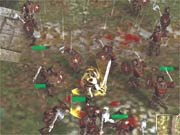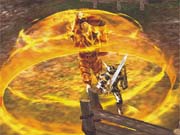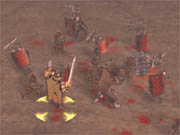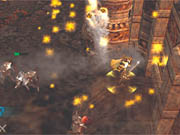Legion first surfaced in late 1999. The original interviews and information about it pegged it as a real-time strategy game with some action and role-playing elements. Now, close to three years later, a very different Legion is upon us. The multiplayer elements that the development team at 7 Studios spoke of are gone, and the entire game has been retooled to focus more on action, with some very light strategy and role-playing elements thrown in for good measure. Legion has many sound concepts, but just about everything falls apart in the execution, resulting in a game that runs the gamut from frustrating to just plain terrible.

The game is a retelling of the story of King Arthur, Excalibur, and the Knights of the Round Table. At the outset, you'll play as Arthur immediately before he claims the sword Excalibur and becomes king. As you progress through the game's storyline, you'll run into characters who eventually join the round table in your quest to avenge your father's death at the hands of your evil sister, Morgan Le Fay. Throughout the game you'll battle Le Fay's armies of warriors, both living and undead, as you try to accomplish a series of objectives. Some levels merely ask you to defeat a boss at the end. Others get a little more involved and command you to protect a village or specific person from harm. Some ask you to do both, which is where the game's strategic elements come into play.
Unfortunately, Legion's first two levels don't have any of that strategy and play more like a needlessly difficult version of Midway's recent Gauntlet Legends games. With only Arthur at your command and with only a couple of uncontrollable swordsmen by your side, you'll have to make your way past a lot of enemies, oftentimes without any hope of healing yourself of any wounds you sustain. This forces you to constantly worry about your health meter and let your nonplayer characters do most of the fighting. Since they're pretty weak, though, this then gives way to a hit-and-run poking game, forcing you to move in, hit an enemy once or twice, and retreat before the enemy retaliates, over and over again. You're left with introductory levels so bad that it's difficult to imagine the rest of the game being any better.

After you get through the atrociously bad opening levels and meet your next playable character, you'll have the ability to command multiple characters. The most basic strategy is to merely command your entire army to follow you around, which creates for you a large posse of swordsmen and archers to take out enemies almost automatically. But breaking up your group lets you be in two places at once. So you can position your archers in a village and put them on guard, while Arthur and his swordsmen roam the countryside to find the level's boss. You can issue a few different commands to your other characters. This lets you set up characters to guard positions or other characters or to simply follow you around and engage any enemies that approach. Eventually you'll be able to take up to four main characters out at once, and each can be joined by up to four nonplayable grunts, giving you four different groups to command and control. However, the characters at your disposal aren't very smart. They'll get stuck behind buildings or caught on corners of things fairly often. This is annoying, but it can have strategic consequences as well. For instance, if your healer gets caught behind a building, he'll cast healing spells in your direction, only to have them blocked by the building, effectively wasting his stamina casting useless spells.
While the commands and multicharacter setup of Legion may sound more like something out of a strategy game, the gameplay is far more action-oriented than it sounds. In combat, you'll actually swing your own weapons and cast your own spells, rather than clicking on icons and hoping for the best. The game uses a timing-based combo system that lets fighters get up to four hits in at a time, each one doing increasing amounts of damage. The timing-based nature of the system is a good idea, as it discourages simple button mashing, but, irritatingly, the game's speed fluctuates just enough when lots of enemies are onscreen to make the timing far more difficult than it should be. A smooth frame rate would have prevented this problem, but the game simply seems to be unable to keep up with the action.

In addition to the speed issues, Legion also has a very muddy and foggy look to it. The edges of the screen are usually grayed out, drawing in as you head in any given direction. The color palette is a little on the dingy side, and the game's textures--particularly those used on the ground--are ugly and ill-defined. The fact that you can zoom in close for a better view of the action only makes the texture problem stand out even further. Overall, the game's visual quality doesn't even approach current standards, and instead Legion looks more like a PSOne game hastily converted up to the PS2. The soundtrack is only marginally better. The music conveys a proper sense of majesty, but the game's dynamic music system means that certain tracks will fade in and out depending on where you are. Running into town triggers one song, but by the time it starts up, you've already been healed and are headed on your way back out, which starts up another track. The voice work and script for the game have been written with a hint of humorous intent and make a few attempts at jokes--such as the ghost-filled level that causes Gwen to shout, "I see dead people!" But in the end, the stunted voice-over work and lame accents ruin any chance of actually drawing you into the game's story.
The mission design requires you to run all over the game's maps, finding items and hidden gold chests along the way. But the developers left out one key feature: an in-mission save. This is especially a problem in the game's second level, which leaves you without any way to heal yourself for most of the mission. Since your additional characters seem to randomly fight well or extremely poorly, and the game's attack and blocking system isn't fleshed out enough to be very responsive, it can be pretty difficult to get all the way across the level and rescue the priest that can heal you. This results in your playing the first half of the mission over and over again while keeping one eye on your life meter all the while. Once you progress and earn additional characters--such as Percival, who will heal your party as you adventure--this isn't as much of a problem, but having to play through mindlessly easy missions to get to the boss who kills you again and again is an annoying chore.

The King Arthur mythos is quality source material that could probably make for a pretty cool game. But Legion: Legend of Excalibur is not that game. The game plays like its developers were unsure if they wanted to make a Gauntlet-like action game or a hero unit-focused strategy game. The combination of the two ideas waters down both concepts, and that along with some poor production values results in a dull end product that should be avoided.